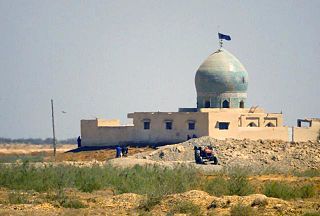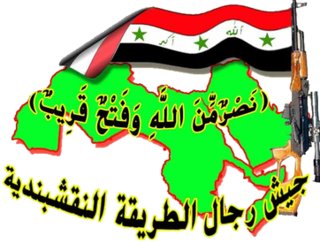
The Gulf War, codenamed Operation Desert Shield for operations leading to the buildup of troops and defense of Saudi Arabia and Operation Desert Storm in its combat phase, was a war waged by coalition forces from 35 nations led by the United States against Iraq in response to Iraq's invasion and annexation of Kuwait arising from oil pricing and production disputes. The war is also known under other names, such as the Persian Gulf War, First Gulf War, Gulf War I, Kuwait War, First Iraq War or Iraq War, before the term "Iraq War" became identified instead with the 2003 Iraq War.

Al-Kūt, also spelled Kut al-Imara or Kut El Amara, is a city in eastern Iraq, on the left bank of the Tigris River, about 160 kilometres south east of Baghdad. As of 2003 the estimated population is about 374,000 people. It is the capital of the province long known as Al Kut, but since the 1960s renamed Wasit.

Sulaymaniyah, also called Slemani, is a city in Iraqi Kurdistan. It is surrounded by the Azmer Range, Goyija Range and the Qaiwan Range in the northeast, Baranan Mountain in the south and the Tasluja Hills in the west. The city has a semi-arid climate with very hot dry summers and cool wet winters. Sulaymaniyah served as the capital of the historic principality of Baban from 1784 to 1850.

Jama'at al-Tawhid wal-Jihad, which may be abbreviated as JTJ or Jama'at, was a militant Jihadist group. It was founded in Jordan in 1999 and was led by Jordanian national Abu Musab al-Zarqawi for the entirety of its existence. During the Iraqi insurgency (2003–11), the group became a decentralized network with foreign fighters and a considerable Iraqi membership.
The Islamic Army in Iraq (IAI) is one of a number of underground Islamist militant organizations formed in Iraq following the 2003 invasion of Iraq by United States and coalition military forces, and the subsequent collapse of the Baathist government headed by Saddam Hussein.
Elections in Iraq gives information on election and election results in Iraq.

United Nations Security Council resolution 1284, adopted on 17 December 1999, after recalling previous relevant resolutions on Iraq, including resolutions 661 (1990), 687 (1991), 699 (1991), 707 (1991), 715 (1991), 986 (1995), 1051 (1996), 1153 (1998), 1175 (1998), 1242 (1999) and 1266 (1999), the Council established the United Nations Monitoring, Verification and Inspection Commission (UNMOVIC) to replace the United Nations Special Commission (UNSCOM). It was the final resolution adopted in 1999.

The Iraq War was a protracted armed conflict that began in 2003 with the invasion of Iraq by a United States-led coalition that overthrew the government of Saddam Hussein, in breach of international law. The conflict continued for much of the next decade as an insurgency emerged to oppose the occupying forces and the post-invasion Iraqi government. An estimated 151,000 to 600,000 or more Iraqis were killed in the first three to four years of conflict. The U.S. became re-involved in 2014 at the head of a new coalition; the insurgency and many dimensions of the civil armed conflict continue. The invasion occurred as part of a declared war against international terrorism and its sponsors under the administration of U.S. President George W. Bush following the September 11 terrorist attacks.

The Islamic State of Iraq and the Levant, also known as the Islamic State of Iraq and Syria, the Islamic State of Iraq and al-Sham, officially as the Islamic State (IS) and by its Arabic language acronym Daesh, is a Salafi jihadist militant group and former unrecognised proto-state that follows a fundamentalist, Salafi doctrine of Sunni Islam. ISIL gained global prominence in early 2014 when it drove Iraqi government forces out of key cities in its Western Iraq offensive, followed by its capture of Mosul and the Sinjar massacre.
The 1973 discovery of arms in the Iraqi Embassy in Pakistan refers to an armed conflict between the State of Pakistan and the Iraqi Embassy situated in Islamabad. The conflict ended with a successful special military operation led by the Pakistan army's Special Service Group (SSG) and the Pakistan Paramilitary Rangers. Following the incident, the Iraqi Ambassador and his staff were expelled from Pakistan as personae non gratae.

Kurdish nationalism holds that the Kurdish people are deserving of a sovereign nation that would be partitioned out of areas in Turkey, northern Iraq, and Syria based on the promised nation of Kurdistan under the Treaty of Sèvres.

The 2007 Yazidi communities bombings occurred on August 14, 2007, when four coordinated suicide bomb attacks detonated in the Yazidi towns of Til Ezer (al-Qahtaniyah) and Siba Sheikh Khidir (al-Jazirah), near Mosul in Iraq.

The Army of the Men of the Naqshbandi Order, also called the Naqshbandi Army, is one of a number of underground Ba'athist and Sufi militant insurgency groups in Iraq. Media frequently refers to the group by the initials JRTN, a romanization of its Arabic name. Supreme Command for Jihad and Liberation, technically the name of the umbrella organisation to which JRTN belongs, is also often used to refer to JRTN specifically.
The First Iraqi–Kurdish War also known as Aylul revolts was a major event of the Iraqi–Kurdish conflict, lasting from 1961 until 1970. The struggle was led by Mustafa Barzani, in an attempt to establish an autonomous Kurdish administration in northern Iraq. Throughout the 1960s, the uprising escalated into a long war, which failed to resolve despite internal power changes in Iraq. During the war, 80% of the Iraqi army was engaged in combat with the Kurds. The war ended with a Kurdish Victory in 1970, resulting in between 75,000 to 105,000 casualties. A series of Iraqi–Kurdish negotiations followed the war in an attempt to resolve the conflict. The negotiations led to the Iraqi–Kurdish Autonomy Agreement of 1970.

The Islamic State of Iraq was a militant Salafist jihadist group that aimed to establish an Islamic state in Sunni, Arab-majority areas of Iraq during the Iraq War and later in Syria during the Syrian Civil War.
Khoshnaw is the name of a Kurdish tribe mainly located north of Erbil city in Iraqi Kurdistan region. This tribe consists of many ethnic and religious groups. They are distributed in many places including khoshnawati land starting from shaqlawa city, and end in betwata district more than 1000 villages and districts.they were found in 1923 after the fall of othman empire their number are between 75000-125000

Beginning in December 2012, Sunnis in Iraq protested against the Maliki government. On 28 December 2013, a Sunni MP named Ahmed al-Alwani was arrested in a raid on his home in Ramadi. Alwani was a prominent supporter of the anti-government protests. This incident led to violence in Al Anbar Governorate between the Iraqi Army and a loose alliance of tribal militias and other groups fighting alongside the Islamic State in Iraq and the Levant (ISIL).
On 15 October 2016, four attacks in and around Baghdad, Iraq, resulted in the deaths of at least 60 victims and at least seven attackers, while injuring at least 80 more people. The Islamic State of Iraq and the Levant are believed to be behind the suicide bombing and two mass shootings.













